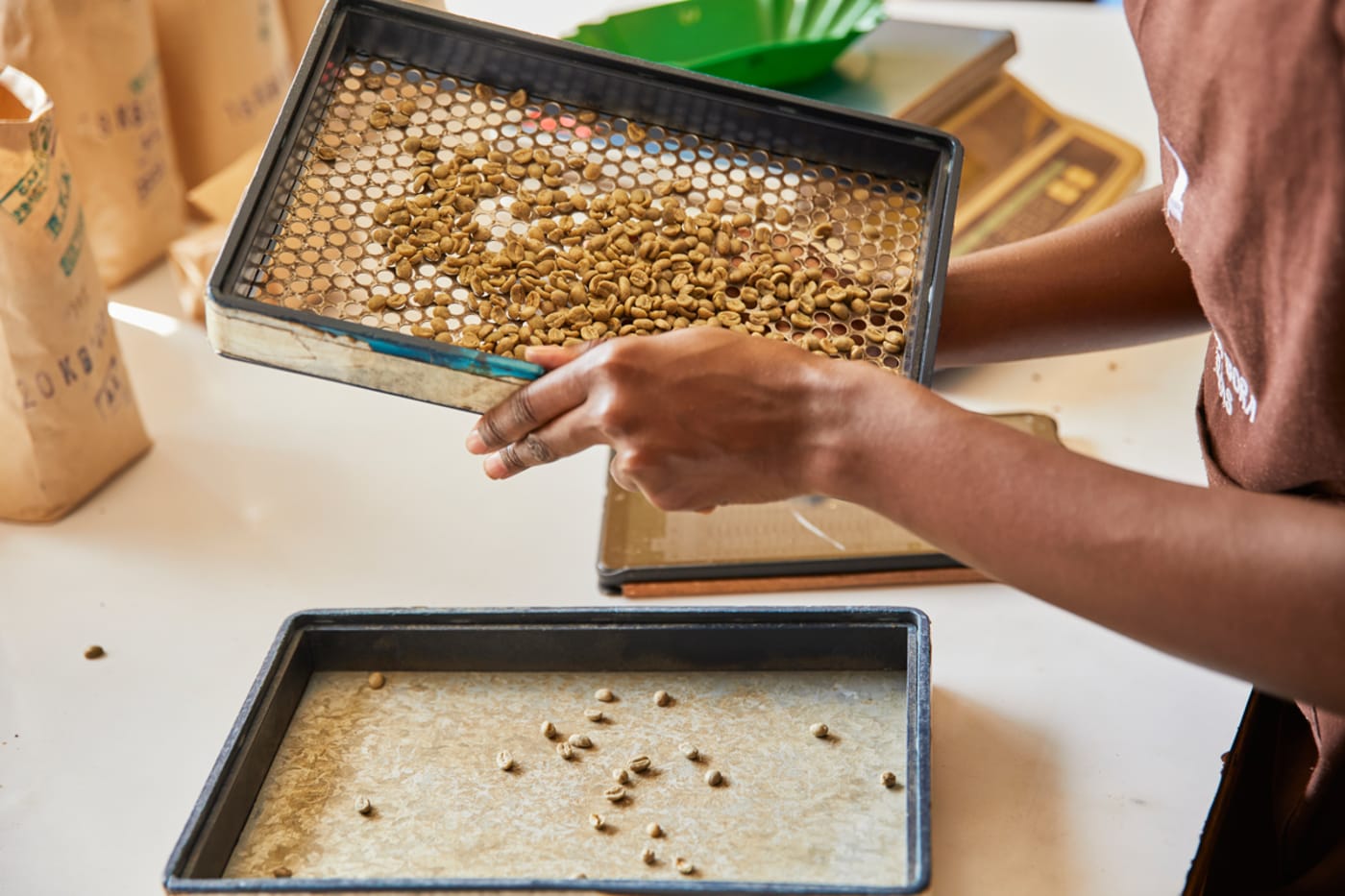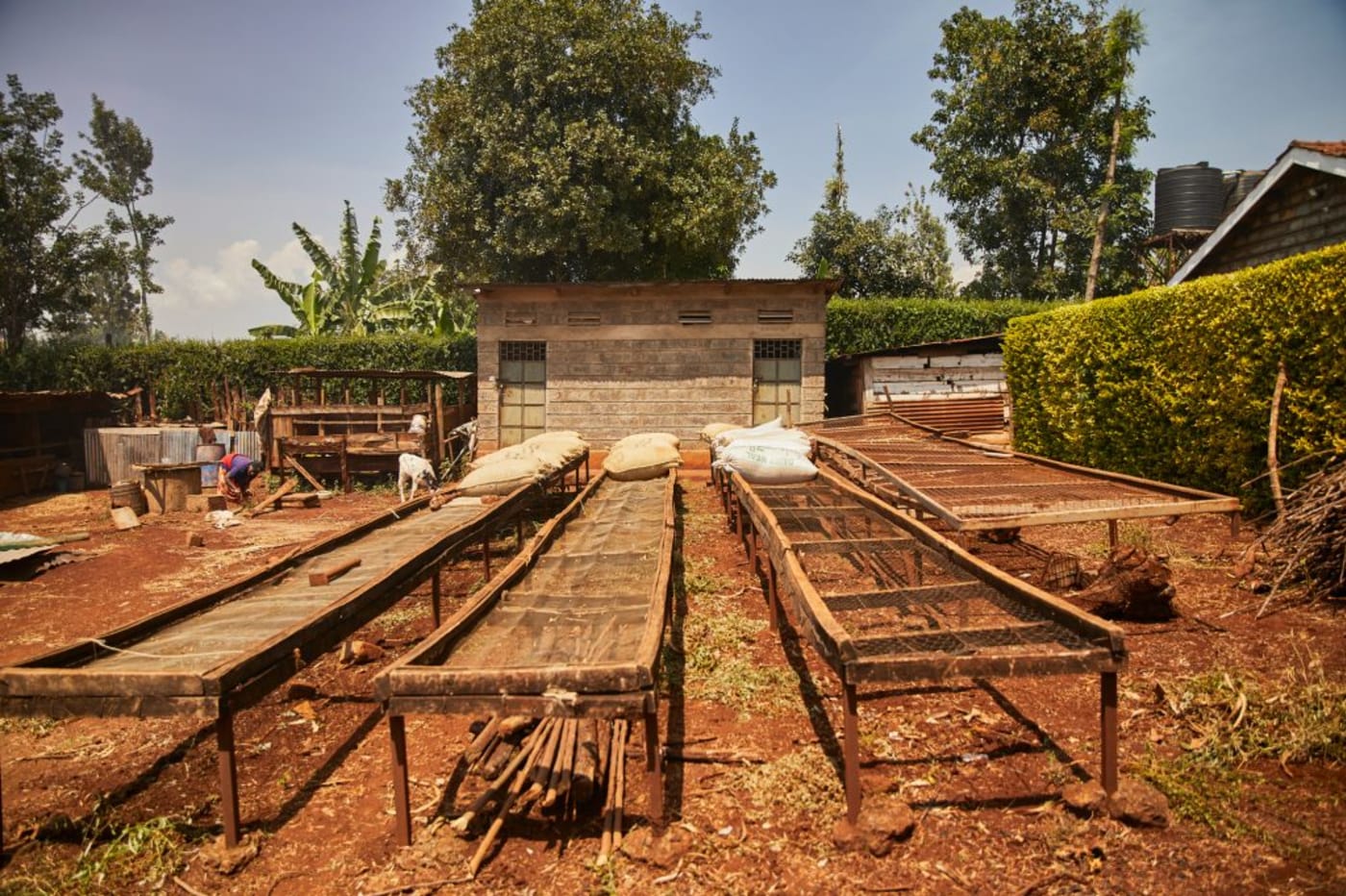A vibrant and light flavour profile with the full acidity you can expect from a traditional washed Kenyan coffee. However, it’s not your typical production approach!
This lot is made up of coffees that were grown and processed by around 30 independent producers who own coffee estates in the region of Ngewa-Komothai, located in Kiambu County, Central Kenya. Typically, the estates are around 2 hectares large and are comprised of a shamba (‘farm’ in Swahili) and small factory (the Kenyan term for a wet mill). They sit between an elevation of 1,600-2,000 meters above sea level in the foothills of the Gatamaiyo Forest Reserve and close to the Komothai river, a large expanse of relatively undisturbed rainforest in Kiambu County. The area is known for being home of the Kenyan Coffee Research Foundation.
The producers who contributed to this lot work together under the name “Ngewa-Komothai Farmers,” and are led by chairman James Ndichu Waweru. The farmers pick, pulp, ferment and dry their coffee crop independently, before their individual lots are blended as dried parchment at Kahawa Bora Mill, in Thika. Though not certified, many of the growers in the region follow organic practices, using only cow manure instead of agrochemicals to feed their coffee trees.

The practice of blending lots from small estates is an initiative started by our exporting partner, Kenyacof, and the team at their affiliated Kahawa Bora dry mill. Many quality-focused small estate owners have not produced enough parchment to meet minimum size requirements at dry mills. For years, this meant that small estate owners frequently ended up selling their parchment to agents who blend their coffee with many other lots, losing traceability and distinction in the process. To help small estate owners reach minimums, maintain traceability and ensure that blended lots uphold the quality of each contribution, Kenyacof facilitates grower groups by connecting small estate owners with others who are nearby and who achieve similar quality standards and profiles. This model also maximises the group’s opportunity to secure the highest price possible for their coffee crops.
These grower groups are more fluid than cooperatives and the exact number or contributing growers involved may change from year to year. However, the guiding principles of Ngewa-Komothai always remain the same – to assist small estate owners access more traceable dry milling and marketing solutions, to achieve better quality and higher prices for their coffees.
The members of the Ngewa-Komothai farmers group receive support from Sucastainability—a marketing agent that is on the ground directly helping them with training, education and support, and to secure fair prices for their milled coffee. Beyond this, Sucastainability connects the farmer group to specialty focused buyers (like MCM) that pay high premiums for exceptional quality.

This micro-lot is graded as an AA. This grade relates to the size (in this case, AA means that the beans are screen size 18 and above). More AA grade coffee is found in Central Kenya than anywhere else in the country, thanks to the high elevations which allow for greater late yields. These later yield cherries have the benefit of better weather, with optimum sunshine and a longer period for the sugars to develop and when they are finally picked, they are typically fuller, redder and heavier than cherries grown in other areas.
The coffee was then dry fermented for an average of 24 hours, to break down the sugars and remove the mucilage (sticky fruit covering) from the outside of the beans. Whilst the coffee was fermenting it was checked and when ready it was rinsed and removed from the tanks.
Using clean water from the nearby Komothai River, the parchment-covered coffee was then washed and graded in water channels, before being transferred to raised drying tables (also known as African Beds). During the drying stage, which takes up to two weeks, the coffee was turned constantly to ensure it is dried evenly, until it reaches 11–12% humidity. Producers received guidance when building their own raised tables, along with the support of Kenyacof’s field officers at every step of the processing.
After the coffee rested, farmers delivered their dry parchment to Kahawa Bora mill (meaning “good coffee mill”) in Thika, Kenya. Here, millworkers analysed the parchment to determine its quality and blended the individual lots together before processing them for export.






